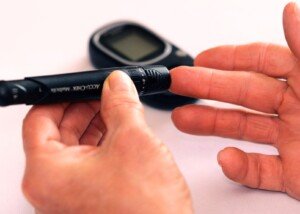
Chronic stress or anxiety causes the body to be in a chronic state of fight or flee, and blood sugar is involved.
The A1C test is more accurate than the fasting glucose test for detecting diabetes or prediabetes.
The A1C shows the average blood sugar (glucose) level for the past two to three months.
It measures the percentage of hemoglobin (a protein in blood that carries oxygen) that’s coated with sugar. So the higher the A1C, the poorer one’s blood sugar control is.
In a fight or flee situation (e.g., primitive man facing a wild boar, and modern man trapped in a traffic jam and late for a big business meeting), the liver provides extra sugar to the bloodstream to help prepare the body for a battle with the perceived threat.
Primitive man worked off the extra sugar by strenuously physically fighting the danger or escaping from it.
Modern man, instead of fighting, stays still (in his car, work cubicle, etc.) and cusses.
The extra sugar doesn’t get worked off by any immediate intense physical activity.
The wild boar goes away or is escaped from. The mounting bills, hostile workplace environment and threat of foreclosure stick around.
This all makes one wonder if chronic stress and anxiety keep the A1C in a persistently elevated state.
“While anxiety/panic can elevate one’s sugar in the flight or fight response, unless they have a predisposition for diabetes or are diabetic, the sugar will not remain in the elevated range, as normal body mechanisms will regulate the sugar,” says Susan L. Besser, MD, with Mercy Medical Center, Baltimore, and Diplomate American Board of Obesity Medicine and board certified by the American Board of Family Medicine.
“However, if someone is a diabetic or prediabetic, chronic anxiety will make it harder to control the sugar over time,” adds Dr. Besser.
Strenuous Exercise Helps Control Blood Sugar
The body doesn’t recognize the difference between the threat of a wild animal and the threat of being fired from one’s job and being evicted.
If you’re facing chronic stress and anxiety, the way to fight this is with strenuous workouts.

Shutterstock/Microgen
The fight or flee response unleashes “stress hormones.” Intense exercise will neutralize these detrimental chemical messengers.
Sure, these hormones work wonderfully if the intense exertion is immediate.
For example, the hormone adrenaline speeds up the heart rate and respiration to prepare you for the fight.
The physical exertion of the fight cancels out the stress hormones by unleashing anabolic hormones.
If you sit and seethe, the stress hormones continue running rampant in your body, causing damage over time (e.g., a chronically fast pulse is not good for the heart).
Stress hormones, when allowed free range over time, also negatively impact digestion, which is why many cases of diarrhea and acid reflux are caused or worsened by ongoing anxiety!
The body doesn’t know the difference between fighting off a wild animal or killing a bootcamp class.
Intense physical exertion will subdue the stress hormones and help regulate sugar levels.

Shutterstock/Phase4Studios
And this means lower A1C levels with your annual checkups.
 Dr. Besser provides comprehensive family care, treating common and acute primary conditions like diabetes and hypertension. Her ongoing approach allows her the opportunity to provide accurate and critical diagnoses of more complex conditions and disorders.
Dr. Besser provides comprehensive family care, treating common and acute primary conditions like diabetes and hypertension. Her ongoing approach allows her the opportunity to provide accurate and critical diagnoses of more complex conditions and disorders.
 Lorra Garrick has been covering medical, fitness and cybersecurity topics for many years, having written thousands of articles for print magazines and websites, including as a ghostwriter. She’s also a former ACE-certified personal trainer.
Lorra Garrick has been covering medical, fitness and cybersecurity topics for many years, having written thousands of articles for print magazines and websites, including as a ghostwriter. She’s also a former ACE-certified personal trainer.
.









































